- Home
- Holly Rayner
Million Dollar Christmas Bride - A Billionaire Romance Page 2
Million Dollar Christmas Bride - A Billionaire Romance Read online
Page 2
“She’s sick,” Jackson said.
“Well, I know that,” Danielle said. “She had to be psychologically unwell in order to think it was a good idea to leave two children behind with barely a goodbye.”
“Not mentally sick. I mean physically,” Jackson said. “Didn’t she tell you over the phone that she was dealing with heart troubles?”
“Yes.”
“Well, maybe she’s coming home so that she can make amends. I don’t know.”
Jackson caught sight of the turn he needed to make and slowed down. Daylight was fading fast, and thanks to his little run-in with another car, he was not as early for his dinner reservations as he’d hoped he would be. He’d been counting on having at least a few sips of a whiskey on the rocks before seeing his mother for the first time in thirty years. Now, it looked like he wouldn’t have time for a trip to the bar before being seated.
“Make amends?” Danielle practically shouted. “I’m sorry, Jackson, but that’s kind of selfish of her, isn’t it? To expect us to forgive her, after she hasn’t even tried to contact us for all these years? Dad was sick and dying, and Mom just went on living her happy life across the ocean, totally oblivious to what we were going through.”
“Look, Dani, I don’t know what she wants, okay?” Jackson said. “I’m just going to meet up with her and have dinner. She’s living here in Memphis now, and I can’t exactly ignore her, given that we’re in the same city. It’s not the same for you. You’re in California.”
“That’s another thing,” Danielle said. “I can’t believe her nerve, moving back into the house we grew up in. When she called, she told me she’s given away most of her money. Our mother, the philanthropist! What a big heart she has! So big that she’ll abandon her children, and—”
“Dani,” Jackson said, cutting his sister off before she could get too heated. “I get it. You’re upset. You don’t have to establish a relationship with her again. But I do—at least just this dinner. I have to see her.”
He felt himself get slightly choked up at the thought of seeing his mother after so long. What would she look like? He could remember what she looked like at the age of forty-four, when she left Tennessee. He’d been ten, and to him, his mother was an angelic figure who swept around the house in long, shimmery evening gowns, perpetually getting ready for one high-society event or another.
When he’d learned that she was leaving them, he’d been crushed.
Now, thirty-one years after her departure, he was going to come face-to-face with her again.
I’m not ten anymore, he thought. I’m a grown man. Her mistakes don’t have power over me anymore.
He tensed his jaw and forced down the knot in his throat. It settled somewhere in his stomach, in a way that felt all too familiar. For years, he’d been stuffing down feelings that threatened to overwhelm him with regards to his mother.
He spotted the sign for the Parlor Grille up ahead. “It’s just dinner,” he said aloud, though the comment was meant more for himself than for Danielle.
“But can you believe that she plans to sell the house we grew up in and donate the funds to charity?” Danielle said. As usual, she was stubbornly refusing to let go of the conversation topic of her choice.
Jackson had years of experience with his sister’s flair for the dramatic. “Easy, Dani,” he said. “I’m going to try to talk to her about that, actually. I want to see if she’ll consider leaving the house to me.”
“You?” Danielle said.
“Well, you don’t want it,” Jackson said.
“Of course I don’t!” Danielle said. “That place has nothing but bad memories. As far as I’m concerned, it should be demolished.”
Jackson pulled into the restaurant’s parking lot and turned off the car. “Come on… you don’t mean that,” he said. “You and I had so many good years in that place. Remember the tire swing out front? And the gardens in the back that led out to the woods? What about the field—”
“We’d run through it, out to that little stream that ran through the property.”
“Right. We built a bridge once!” Jackson said.
“Sure, but that was all so long ago. Who cares?”
Jackson sighed. “If you don’t care about the place, why are you upset that Mom’s living there now? Come on. You can’t really mean it when you say you don’t care.”
“I do mean it,” Danielle said. “Good riddance to it. I just don’t want Mom to live there because she doesn’t deserve to. She left us.”
“Now you just sound cold and bitter,” Jackson said. “Mom is family.”
“She’s not my family,” Danielle said resolutely. “She left us, not the other way around. It took a long time for me to be okay after that, and goodness knows I’ve spent enough on therapy. I’m not going through all of that again. I’ve put to rest all of my feelings for her, so yes, I’m sure I do sound cold. That’s because I don’t care about her. I can’t let myself care. I’ve moved on, Jackson. Have you?”
The question hung in the insulated capsule of Jackson’s sports car.
He cleared his throat and tried to prepare an answer.
He couldn’t speak. He didn’t know what the answer was. He had a vague sense that he’d never be able to move on from the pains of his childhood as clearly and with as much discipline as his sister had. They’d always been so different, he and Danielle. He was the sentimental one, who cherished photographs and saved old greeting cards, while Danielle preferred to toss items like that into the trash bin and move on. Maybe that was why she’d moved off to Los Angeles at the age of eighteen, while Jackson had decided to stay in the very city he was raised in.
Thankfully, Danielle interjected before he was forced to answer her question. “Oh, shoot, I’ve got to run. Stan just pulled up and we have dinner reservations at a new club downtown.”
Jackson said a quick goodbye before she hung up, then leaned back against the headrest.
What was he getting into with this visit with his mother? Was Danielle smart to make a clean break from her past? Was he only hurting himself by diving back in?
He had a feeling that seeing his mother was going to open up old wounds from his childhood, and that was the last thing he wanted.
He felt a knot tighten in his throat, and he dealt with it swiftly, by expertly ignoring it until it relocated.
“It’s just dinner,” he murmured to himself as he pushed open the car door and strode toward the restaurant.
Maybe I am foolish for meeting her here, but maybe not. Maybe this will be good for me—in some way that I can’t see, quite yet. And maybe I’ll be able to convince her not to give away that house.
I grew up in that house. It’s a piece of my childhood. I can’t let her throw it away.
Memories of his childhood flitted through his mind as he walked into the restaurant’s expansive entryway.
The maître d’ recognized him and ushered him forward. “Mr. Wylde! It’s so wonderful you are here. I just seated your mother a few minutes ago. She’s eager to see you.”
Jackson followed the man through the bustling dining room. Though it was only mid-November, classical music with a distinct holiday ring to it floated through the air, and the gold candle holders in the center of each table were ringed with little wreaths of evergreen, complete with miniature red velvet bows.
The decorations reminded him of the picture-perfect way his mother would decorate the house at Christmastime—before she abandoned them, that is. Jackson had preferred his father’s casual style, cutting down a tree, opening new toys from Santa, and watching football together.
When Jackson spotted his mother, Mary, he tried to arrange his features so that they would not show shock. He pasted a smile on his lips, though he felt anything but happy. The woman before him, who looked older than her seventy-five years, was far from the graceful, porcelain-faced woman he remembered from his youth. She was stooped, and struggled to get up out of her chair to greet him.
&nb
sp; “Jackson, my boy,” she said, as she reached up and wrapped a bony arm around his neck.
He had to lean over so that she could reach him. Her wrist pressed into his collar bone. She let her arm slip a bit and gave him a pat before pulling away. He remembered that she’d never been overly affectionate, and that seemed to be the same. She had a sour expression on her pinched face, as if hugging him had been a strain.
“You’re so tall,” she said.
“That’s what happens when you grow up,” Jackson said. “I was ten the last time you saw me, hm?” He waited as his mother sat, and then he took a seat as well.
“Was that all?” his mother said, with a bewildered shake of her head. “I could have sworn you’d turned thirteen that year.”
“No, ma’am,” Jackson said, with a slight shake of his head. “Ten.”
“Just a boy,” Mary said. “And look at you now. So handsome.” It was a compliment, but she said it with a twinge of annoyance. “Just like your father,” she added. “He was a looker, that man. That’s why I fell for him.” She reached for her glass of white wine, which had apparently been delivered before Jackson’s arrival.
Jackson raised his eyes to the maître d’, who was hovering nearby. He seemed relieved to be acknowledged. It must have been awkward for him to witness the strained reunion as a mere bystander.
“Your usual, Mr. Wylde?” he asked.
Jackson nodded, happy that a drink would soon arrive to ease the tension he felt mounting within him.
When the maître d’ left, Jackson found himself alone with Mary. It was like being with a stranger.
He had no idea how he could possibly convey to her what her departure had meant in his life. How could he share the fact that everything had changed so dramatically in her absence? How could he share with her the feelings he’d had as a child, when he’d finally realized that she wasn’t going to come home? He could barely get in touch with those feelings for himself, let alone speak about them to the very person who had caused them.
So instead of trying to put the swirling, nebulous aches in his chest and gut into words, he reached for the glass of ice water on the table and avoided his mother’s eyes as he took a sip.
“How was your flight over from Scotland?” he asked, once he’d swallowed.
“Long. Exhausting. Thank goodness I didn’t get a blood clot,” Mary said. She then launched into a long and winding commentary on international travel, which, apparently, she’d done quite a bit of over the years.
Jackson picked up on the fact that she’d continued with the high-society ways that she’d established in Memphis with his father. But instead of balls at sprawling Southern country clubs, she’d turned her focus to internationally flavored events. She spoke of meeting ambassadors, dignitaries, and various European royalty.
Jackson barely managed to keep up with her stories, given the tense state he was in. He was happy when a server brought over his drink and took their order, though that provided only a brief interlude to her tales of traveling the world with the man she’d left his father for.
Finally, she wrapped up. “Anyway, when Lachlan died I was at a loss. It was like my world crumbled right beneath my feet. I’m sure you know the feeling.”
“I’m sure I do,” Jackson said. He took a sip of his drink.
“I was a wreck for months. He was just such a sweet man. We were in love. But life goes on, you know? And I couldn’t continue to grieve forever. His loss taught me that we all leave this earth at one point or another. I started to think about that and really contemplate what I wanted to do with the years I have left.”
Jackson finally managed to look at her. “You’re not sick, are you?” he asked. This talk of death made him feel uneasy. Losing his father fifteen years prior had been hard. He dreaded the idea of seeing another parent succumb to cancer.
“No, no,” she said. “My heart’s not what it used to be, but doctors keep prescribing pills. I forget to take them now and then, and I pay the price for that. But as long as I remember, my heart works fine.
“It won’t forever, though, and that’s my point. That’s why I’m here, back in Tennessee—the state I was born in. I didn’t know what it would be like to come back here, but it’s beautiful. Everything out by the old house is just the same. The trees are bigger, but…” Her voice drifted off thoughtfully just as the server arrived with their food.
Jackson reached for his steak knife and slid it through the meat before him. “About that,” he said. “The house, I mean.” He cleared his throat. “Danielle tells me that you plan to leave the house to charity in your will. Is that right?”
Mary poked her fork into the pile of risotto on her plate. “Mm-hmm… the Memphis Opera. I’ve always loved the productions they put on, and the arts are a worthy cause.”
Jackson felt his cheeks flush. The opera! he thought. He knew for a fact that the opera was hardly hurting for funding—it was a favorite charity for every member of Memphis’s elite that wanted a respectable nonprofit to give hefty, tax-deductible checks to.
“Are you sure that’s what you want to do?” Jackson said, before biting into the steak on his fork. “Danielle and I both grew up in that house. Why not leave it to one of us?”
“Ha!” Mary laughed. “Danielle is married to one of the highest-paid producers in Hollywood. She doesn’t want anything to do with that property. And you inherited your father’s empire! You’re surely one of the richest men in the country. What would you want with that old house?”
She didn’t give him a chance to answer. Instead she said, “I’ve made plenty of mistakes in my life, Jackson, and I’m not about to make another. I’m trying to do good in my limited time left. Now—” She lifted her gaze and focused it on Jackson. “I want to know how it’s been going with your father’s grocery store chain. I hear you’re CEO of Wylde’s now, is that true?”
Jackson nodded. He felt bothered by the fact that his mother had so quickly changed the topic of conversation away from the one thing that he really wanted to talk about. But he saw no way of tactfully bringing up the house again. Besides, thinking about the house made him emotional, and he didn’t like that. Speaking about work was safer ground.
“It’s been going well,” he said. “We’ve expanded into Illinois, Indiana, and Delaware. We’re considering a few test stores in New England down the road. My team is working on that.”
“You sound just like your father,” Mary said, with the same sour expression she’d worn earlier. Her lips pinched together into two thin pink lines as she shook her head. “While we were together he opened up over one hundred new stores; did you know that? Went from being just another store to the most successful grocery stores in the South. Your father wasn’t much of a romantic, but he sure did know business.”
She nibbled on a bite of creamy rice and washed it down with white wine. After patting her pursed lips with a cloth napkin, she said, “And what about you, Jackson? You’re obviously a good businessman, but how about your personal life? Are you seeing anyone?”
Jackson curled his lips in a wry smile. He disliked answering questions about relationships. He dated occasionally, but his flings never seemed to last.
“I’m married to my work, my assistant likes to say.” As he spoke, the holiday music floating through the speakers reached a crescendo.
Mary’s eyes lit up, and for the first time that evening, she smiled. “What was that? Did you say you’re married? The music was too loud… I didn’t hear the rest of it.”
She leaned forward with excitement. “Oh, Jackson! Here I was, thinking that you were just like your father—obsessed with business. But you’re married! Tell me about it.”
Jackson opened his mouth to protest but then stopped short. All evening he’d sensed that his mother was disappointed in him. He’d been barely conscious of it. But now, sensing her obvious approval and joy, he became more aware of the contrast.
She’s happy thinking that I’m married, he thought
. She approves of it. Maybe this is my inroad to a new relationship with her.
“Almost,” he said. He licked his lips, then sat up straighter and squared his shoulders. “I’m engaged. To a beautiful woman. I hope you’ll meet her one day.”
What on earth am I getting myself into? he thought, as his mother’s smile widened and she clapped her hands together twice.
“Oh! Jackson, I would enjoy that. She must be very special. The Historical Society is hosting a charity dinner this Saturday; why don’t you bring her along? I’ll call up the event organizers and book two more plates at my table so the three of us can chat.”
“Sounds great,” Jackson said. Inwardly, he groaned. The hole he was digging just got deeper.
“I’ll look forward to it,” Mary said happily, just as the waiter passed by. She lifted one weathered hand. “Waiter! I’d love another glass of wine,” she said. “But not another chardonnay. That was far too…” She launched into a litany of complaints about the wine that had been served.
“So will I,” Jackson murmured, though his mother was no longer listening.
Chapter 3
Jackson
Jackson fiddled with the dials on his Porsche’s stereo. Usually, he enjoyed listening to music on the way to his office at the Wylde Stores headquarters in downtown Memphis; today, he couldn’t seem to find a song that suited his mood.
It was the morning following his dinner with Mary, and the pale-peach orb of the sun was just peeking out from behind the tall buildings that lined the street. He could tell it was going to be an unseasonably warm day—a relief given the cold weather that had plagued the city ever since November began—but he felt far from sunny. He couldn’t stop thinking about the lie he’d told the night before.
I told her I was going to be married, he thought, and I’m not even in a relationship. The last woman I dated was…
“Whew…” He blew out an exasperated sigh, which caught his passenger’s attention.

 The Billionaire's First Christmas - A Sweet Christmas Romance
The Billionaire's First Christmas - A Sweet Christmas Romance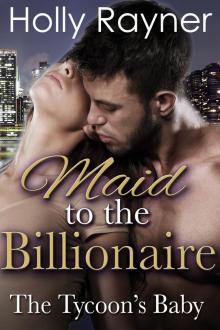 The Tycoon's Baby
The Tycoon's Baby The Sheikh's Twin Baby Surprise
The Sheikh's Twin Baby Surprise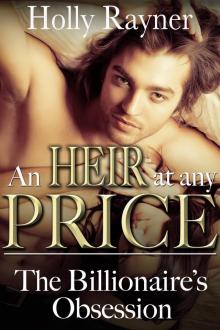 The Billionaire's Obsession
The Billionaire's Obsession_preview.jpg) His Indecent Proposal
His Indecent Proposal_preview.jpg) The Billionaire Deception
The Billionaire Deception The Billionaire's Romance
The Billionaire's Romance Marrying The Sheikh
Marrying The Sheikh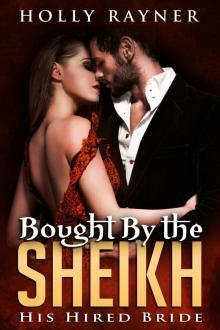 His Hired Bride
His Hired Bride The Sheikh's Irresistible Proposal
The Sheikh's Irresistible Proposal The Sheikh's Green Card Bride
The Sheikh's Green Card Bride The Sheikh's Triplet Baby Surprise
The Sheikh's Triplet Baby Surprise The Sheikh's Secret Princess
The Sheikh's Secret Princess The Sheikh's Accidental Bride
The Sheikh's Accidental Bride The Billionaire's Promise
The Billionaire's Promise The Billionaire's Wife
The Billionaire's Wife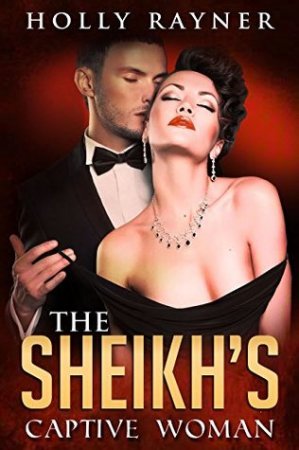 The Sheikh's Captive Woman
The Sheikh's Captive Woman The Sheikh's Secret Love Child
The Sheikh's Secret Love Child The Tycoon's Love
The Tycoon's Love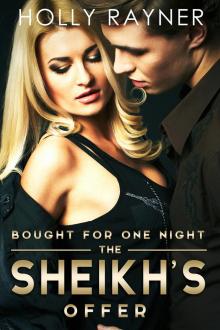 Bought For One Night: The Sheikh's Offer
Bought For One Night: The Sheikh's Offer The Sheikh's Purchased Bride
The Sheikh's Purchased Bride Wifed By The Sheikh
Wifed By The Sheikh Fated Lovers
Fated Lovers The Sheikh's Tempted Protectress
The Sheikh's Tempted Protectress The Sheikh's Quadruplet Baby Surprise
The Sheikh's Quadruplet Baby Surprise Stolen: Business or Pleasure
Stolen: Business or Pleasure Forever His
Forever His The Billionaire's Forgiveness
The Billionaire's Forgiveness Stolen: Meant To Be
Stolen: Meant To Be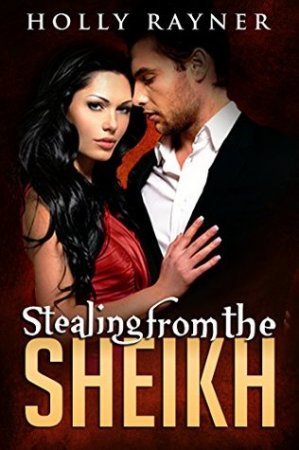 Stealing From The Sheikh
Stealing From The Sheikh The Sheikh's Tempted Prisoner (All He Desires Book 4)
The Sheikh's Tempted Prisoner (All He Desires Book 4) Playboy Prince, Single Dad (Love Is Priceless Book 4)
Playboy Prince, Single Dad (Love Is Priceless Book 4)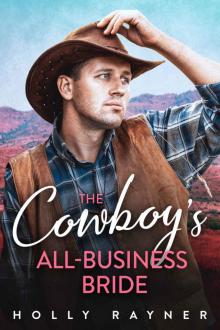 The Cowboy's All-Business Bride (Billionaire Cowboys Book 5)
The Cowboy's All-Business Bride (Billionaire Cowboys Book 5) The Sheikh's Forbidden Tryst - A Sheikh Romance (Princes of the Middle East Book 2)
The Sheikh's Forbidden Tryst - A Sheikh Romance (Princes of the Middle East Book 2) The Single Dad's New Twins (Billionaire Cowboy Romance)
The Single Dad's New Twins (Billionaire Cowboy Romance) The Billionaire's Convenient Bride (Billionaire Cowboys Book 3)
The Billionaire's Convenient Bride (Billionaire Cowboys Book 3) Her Accidental Prince - A Married by Mistake Romance
Her Accidental Prince - A Married by Mistake Romance Single Mom And The Sheikh (Princes of the Middle East Book 3)
Single Mom And The Sheikh (Princes of the Middle East Book 3) Ravishing Royals Box Set: Books 1 - 5
Ravishing Royals Box Set: Books 1 - 5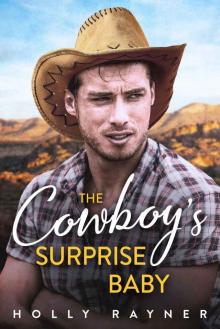 The Cowboy's Baby Surprise - A Billionaire Romance (Billionaire Cowboys Book 2)
The Cowboy's Baby Surprise - A Billionaire Romance (Billionaire Cowboys Book 2) Most Eligible Single Dad - A Billionaire's Secret Baby Romance (Love Is Priceless Book 2)
Most Eligible Single Dad - A Billionaire's Secret Baby Romance (Love Is Priceless Book 2) The Sheikh's Priceless Baby
The Sheikh's Priceless Baby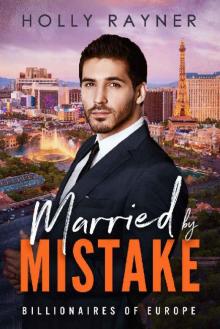 Married By Mistake (Billionaires of Europe Book 7)
Married By Mistake (Billionaires of Europe Book 7) Million Dollar Christmas Bride - A Billionaire Romance
Million Dollar Christmas Bride - A Billionaire Romance Accidental Billionaire Daddy
Accidental Billionaire Daddy The Billionaire's First Christmas
The Billionaire's First Christmas The Baby Pact (Babies and Billions Book 5)
The Baby Pact (Babies and Billions Book 5) The Sheikh's Must-Have Baby
The Sheikh's Must-Have Baby Dr. Single Dad - A British Billionaire Romance (Billionaires of Europe Book 6)
Dr. Single Dad - A British Billionaire Romance (Billionaires of Europe Book 6)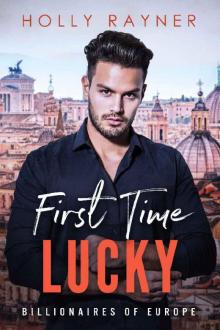 First Time Lucky (Billionaires of Europe Book 5)
First Time Lucky (Billionaires of Europe Book 5) Wifed By The Sheikh (All He Desires Book 3)
Wifed By The Sheikh (All He Desires Book 3) Bought By The Sheikh Next Door
Bought By The Sheikh Next Door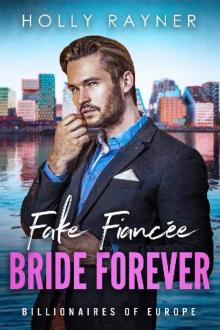 Fake Fiancée, Bride Forever
Fake Fiancée, Bride Forever Auctioned To The Sheikh (All He Desires Book 5)
Auctioned To The Sheikh (All He Desires Book 5) The Sheikh’s American Love - A Box Set
The Sheikh’s American Love - A Box Set The Greek's Green Card Bride - A Billionaire Romance
The Greek's Green Card Bride - A Billionaire Romance The Billionaire's First Christmas - Contemporary Romance
The Billionaire's First Christmas - Contemporary Romance Fake Bride Wanted - A Second Chance Billionaire Romance (Billionaires of Europe Book 1)
Fake Bride Wanted - A Second Chance Billionaire Romance (Billionaires of Europe Book 1) Wanted By The Billionaire Cowboy - A Second Chance Romance (Billionaire Cowboys Book 6)
Wanted By The Billionaire Cowboy - A Second Chance Romance (Billionaire Cowboys Book 6) His Royal Twins (Wedded to the Sheikh Book 4)
His Royal Twins (Wedded to the Sheikh Book 4) Christmas Treats Box Set: Books 1 - 4
Christmas Treats Box Set: Books 1 - 4 Stolen: The Billionaire Deception
Stolen: The Billionaire Deception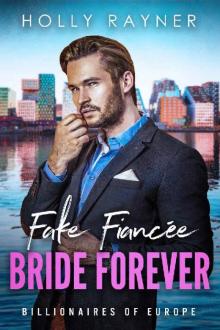 Fake Fiancée, Bride Forever (Billionaires of Europe Book 8)
Fake Fiancée, Bride Forever (Billionaires of Europe Book 8) The Tycoon's Temporary Twins
The Tycoon's Temporary Twins Sold To The Sheikh Bidder (The Sheikh's New Bride Book 4)
Sold To The Sheikh Bidder (The Sheikh's New Bride Book 4) His Beloved Bride (Wedded to the Sheikh Book 3)
His Beloved Bride (Wedded to the Sheikh Book 3) The Sheikh's Bought Ballerina (The Sheikh's New Bride Book 6)
The Sheikh's Bought Ballerina (The Sheikh's New Bride Book 6) The Sheikh's Small Town Baby (Small Town Sheikhs Book 1)
The Sheikh's Small Town Baby (Small Town Sheikhs Book 1) The Sheikh's ASAP Bride
The Sheikh's ASAP Bride The Sheikh's Bride Bet
The Sheikh's Bride Bet Sold To The Sheikh: His Indecent Proposal (An Interracial Sheikh Romance Novel)
Sold To The Sheikh: His Indecent Proposal (An Interracial Sheikh Romance Novel) The Sheikh's American Baby (The Sheikh's Every Wish Book 5)
The Sheikh's American Baby (The Sheikh's Every Wish Book 5) The Sheikh's Virgin Bride - A Sweet Bought By The Sheikh Romance
The Sheikh's Virgin Bride - A Sweet Bought By The Sheikh Romance Seduced By The Sheikh Doctor - A Small Town Doctor Romance
Seduced By The Sheikh Doctor - A Small Town Doctor Romance Servant To The Sheikh
Servant To The Sheikh The Sheikh And The Cowgirl
The Sheikh And The Cowgirl The Sheikh's Stolen Lover - A Second Chance Sweet Romance (The Sheikh's New Bride Book 5)
The Sheikh's Stolen Lover - A Second Chance Sweet Romance (The Sheikh's New Bride Book 5) The Prince's ASAP Baby
The Prince's ASAP Baby An Heir for Alexandros: The Greek Billionaire's Baby
An Heir for Alexandros: The Greek Billionaire's Baby Bought And Paid For: The Sheikh's Kidnapped Lover
Bought And Paid For: The Sheikh's Kidnapped Lover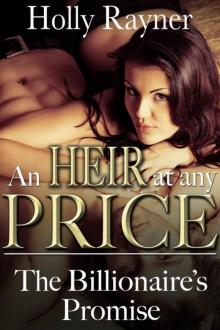 The Billionaire's Promise (An Heir At Any Price Book 3)
The Billionaire's Promise (An Heir At Any Price Book 3) Sold To The Sheikh Bidder
Sold To The Sheikh Bidder The Sheikh’s Second Chance Lover
The Sheikh’s Second Chance Lover The Sheikh's Baby Bet
The Sheikh's Baby Bet Sold To The Sheikh: Fated Lovers (Book Two) - Sheikh Romance
Sold To The Sheikh: Fated Lovers (Book Two) - Sheikh Romance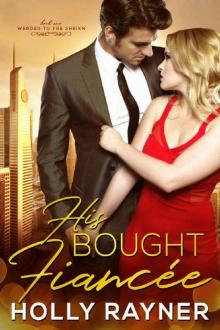 His Bought Fiancée (Wedded to the Sheikh Book 1)
His Bought Fiancée (Wedded to the Sheikh Book 1) The Greek Billionaire's Marriage Matchmaker
The Greek Billionaire's Marriage Matchmaker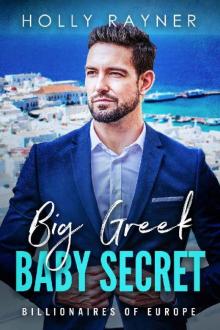 Big Greek Baby Secret
Big Greek Baby Secret The Prince's Triplet Baby Surprise - A Multiple Baby Royal Romance
The Prince's Triplet Baby Surprise - A Multiple Baby Royal Romance Seduced By The Sheikh Doctor - A Small Town Doctor Romance (Small Town Sheikhs Book 2)
Seduced By The Sheikh Doctor - A Small Town Doctor Romance (Small Town Sheikhs Book 2) Fake Bride Wanted
Fake Bride Wanted The Sheikh's Scandal
The Sheikh's Scandal The Sheikh's Contract Bride
The Sheikh's Contract Bride The Sheikh's Quadruplet Baby Surprise (The Sheikh's Baby Surprise Book 4)
The Sheikh's Quadruplet Baby Surprise (The Sheikh's Baby Surprise Book 4) Greek Passions - A Greek Billionaire Box Set
Greek Passions - A Greek Billionaire Box Set The Sheikh's Surrogate Bride
The Sheikh's Surrogate Bride Sheikh Obsessions - A Sheikh Romance Box Set
Sheikh Obsessions - A Sheikh Romance Box Set Stolen: Business or Pleasure (Contemporary Billionaire Romance)
Stolen: Business or Pleasure (Contemporary Billionaire Romance) The Billionaire's Christmas Bundle Of Joy - A Secret Baby Romance
The Billionaire's Christmas Bundle Of Joy - A Secret Baby Romance Seduced By The Sheikh Doctor_A Small Town Doctor Romance
Seduced By The Sheikh Doctor_A Small Town Doctor Romance The Sheikh's Borrowed Baby (More Than He Bargained For Book 7)
The Sheikh's Borrowed Baby (More Than He Bargained For Book 7) The Sheikh's Small Town Baby
The Sheikh's Small Town Baby The Sheikh's Online Bride - A Modern Mail Order Romance
The Sheikh's Online Bride - A Modern Mail Order Romance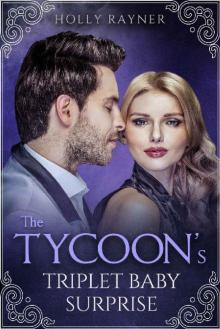 The Tycoon's Triplet Baby Surprise
The Tycoon's Triplet Baby Surprise The Sheikh's ASAP Baby
The Sheikh's ASAP Baby The Sheikh's Bride Bargain (You Can't Turn Down a Sheikh Book 4)
The Sheikh's Bride Bargain (You Can't Turn Down a Sheikh Book 4) The Sheikh's Sextuplet Baby Surprise
The Sheikh's Sextuplet Baby Surprise The Sheikh's Tempted Prisoner
The Sheikh's Tempted Prisoner The Sheikh's Stolen Bride-To-Be
The Sheikh's Stolen Bride-To-Be The Sheikh's Surrogate Bride - A Sheikh Buys a Baby Romance
The Sheikh's Surrogate Bride - A Sheikh Buys a Baby Romance The Sheikh's Priceless Bride
The Sheikh's Priceless Bride The Sheikh's Borrowed Baby
The Sheikh's Borrowed Baby The Sheikh's Secret Love Child (The Sheikh's Baby Surprise Book 2)
The Sheikh's Secret Love Child (The Sheikh's Baby Surprise Book 2) His For A Price - A Bought by the Billionaire Romance (Billionaires of Europe Book 4)
His For A Price - A Bought by the Billionaire Romance (Billionaires of Europe Book 4) Secret Triplets
Secret Triplets The Billionaire's Lessons in Christmas
The Billionaire's Lessons in Christmas Bought By The Sheikh Single Dad_A Sweet Sheikh Romance
Bought By The Sheikh Single Dad_A Sweet Sheikh Romance The Sheikh's ASAP Bride - A Sheikh Buys a Bride Romance (The Sheikh's New Bride Book 3)
The Sheikh's ASAP Bride - A Sheikh Buys a Bride Romance (The Sheikh's New Bride Book 3) The Sheikh's Tempted Protectress (The Sheikh's Every Wish Book 4)
The Sheikh's Tempted Protectress (The Sheikh's Every Wish Book 4) The Sheikh's Priceless Bride (The Sheikh's New Bride Book 1)
The Sheikh's Priceless Bride (The Sheikh's New Bride Book 1) The Sheikh's Scheming Sweetheart
The Sheikh's Scheming Sweetheart Bought And Paid For: The Tycoon's Sheikha Bride
Bought And Paid For: The Tycoon's Sheikha Bride The Sheikh's Secret Child - A Single Dad Romance (The Sheikh's New Bride Book 7)
The Sheikh's Secret Child - A Single Dad Romance (The Sheikh's New Bride Book 7) The Sheikh's Quintuplet Baby Surprise
The Sheikh's Quintuplet Baby Surprise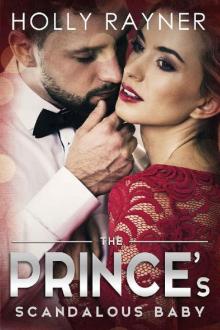 The Prince's Scandalous Baby
The Prince's Scandalous Baby Fake Bride Wanted_A Second Chance Billionaire Romance
Fake Bride Wanted_A Second Chance Billionaire Romance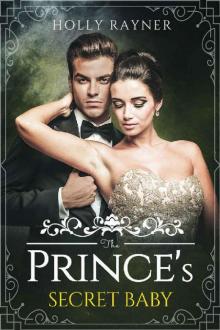 The Prince's Secret Baby (A Baby for the Prince Book 1)
The Prince's Secret Baby (A Baby for the Prince Book 1)